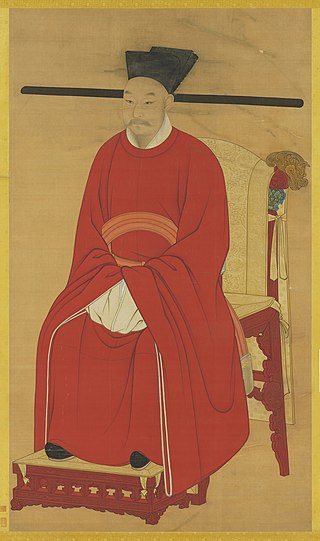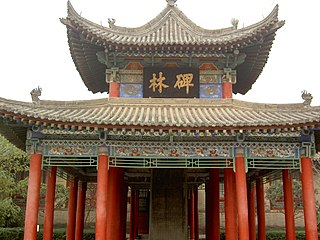
Song, known as Liu Song, Former Song (前宋) or Song of (the) Southern dynasties (南朝宋) in historiography, was an imperial dynasty of China and the first of the four Southern dynasties during the Northern and Southern dynasties period. It succeeded the Eastern Jin dynasty and preceded the Southern Qi dynasty.

Filial piety is the virtue of exhibiting love and respect for one's parents, elders, and ancestors, particularly within the context of Confucian, Chinese Buddhist, and Daoist ethics. The Confucian Classic of Filial Piety, thought to be written around the late Warring States-Qin-Han period, has historically been the authoritative source on the Confucian tenet of filial piety. The book—a purported dialogue between Confucius and his student Zengzi—is about how to set up a good society using the principle of filial piety. Filial piety is central to Confucian role ethics.

Emperor Guangzong of Song, personal name Zhao Dun, was the 12th emperor of the Song dynasty of China and the third emperor of the Southern Song dynasty.
The Book of Wei, also known by its Chinese name as the Wei Shu, is a classic Chinese historical text compiled by Wei Shou from 551 to 554, and is an important text describing the history of the Northern Wei and Eastern Wei from 386 to 550. Widely regarded as the official and authoritative source historical text for that period, it is one of the Twenty-Four Histories.
Xiaolian, was the standard of nominating civil officers started by Emperor Wu of Han in 134 BC. It lasted until its replacement by the imperial examination system during the Sui dynasty. In Confucian philosophy, filial piety is a virtue of respect for one's parents and ancestors.

The Classic of Filial Piety, also known by its Chinese name as the Xiaojing, is a Confucian classic treatise giving advice on filial piety: that is, how to behave towards a senior such as a father, an elder brother, or a ruler.
Empress Gao was an empress of the Xianbei-led Northern Wei dynasty of China. Her husband was Emperor Xiaowu.
Emperor Xiaojing of Eastern Wei ( 魏孝靜帝), personal name Yuan Shanjian (元善見), was the founder and the only emperor of China's Eastern Wei dynasty. In 534, the Emperor Xiaowu of Northern Wei had fled the capital Luoyang to reestablish the imperial government at Chang'an. Northern Wei's paramount general Gao Huan made Emperor Xiaojing emperor as Emperor Xiaowu's replacement. Gao Huan moved the capital from Luoyang to Yecheng, thus dividing Northern Wei into two. Emperor Xiaojing's state became known as Eastern Wei. Although Gao Huan treated him with respect, real power was in the hands of Gao Huan, and then Gao Huan's sons Gao Cheng and Gao Yang. In 550, Gao Yang forced Emperor Xiaojing to yield the throne to him, ending the Eastern Wei and establishing the Northern Qi dynasty. Around the new year 552, the former Emperor Xiaojing was poisoned to death on the orders of the new emperor.
Empress Gao was an empress of the Xianbei-led Chinese Eastern Wei dynasty. Her husband was Emperor Xiaojing, Eastern Wei's only emperor.

Gao Huan, Xianbei name Heliuhun (賀六渾), formally Prince Xianwu of Qi (齊獻武王), later further formally honored by Northern Qi initially as Emperor Xianwu (獻武皇帝), then as Emperor Shenwu (神武皇帝) with the temple name Gaozu (高祖), was the paramount general and a minister of the Xianbei-led Northern Wei dynasty and its branch successor state Eastern Wei dynasty. Although he was an ethnic Han, Gao was deeply influenced by Xianbei culture and was often considered more Xianbei than Han by his contemporaries. During his career, he and his family became firmly in control of the Eastern Wei court. Eventually, in 550, his son Gao Yang forced Emperor Xiaojing of Eastern Wei to yield the throne to him, establishing the Gao clan as the imperial house of a new Northern Qi dynasty.

Emperor Wenxuan of (Northern) Qi ( 齊文宣帝) (526–559), personal name Gao Yang, courtesy name Zijin (子進), Xianbei name Hounigan (侯尼干), was the founding emperor of the Northern Qi dynasty of China. He was the second son of the Eastern Wei's paramount general Gao Huan. Following the death of his brother and Gao Huan's designated successor and eldest son Gao Cheng in 549, Gao Yang became the regent of Eastern Wei. In 550, he forced the Emperor Xiaojing of Eastern Wei to yield the throne to him, ending the Eastern Wei dynasty and starting the Northern Qi dynasty.
Princess Pingyi (馮翊公主), later honored as Empress Wenxiang (文襄皇后), formally posthumously honored as Empress Jing by Northern Qi, was a princess of the Chinese Northern Wei dynasty and its branch successor state Eastern Wei. She was the sister of Emperor Xiaojing of Eastern Wei, and the wife of Eastern Wei's paramount official Gao Cheng, son of Gao Huan.

The Kaicheng Stone Classics (開成石經) or Tang Stone Classics are a group of twelve early Chinese classic works carved on the orders of Emperor Wenzong of the Tang dynasty in 833–837 as a reference document for scholars. The works recorded are:
The Xiaotang Mountain Han Shrine also known as the Guo Family Ancestral Hall is a funerary stone shrine from the early Eastern Han dynasty situated on slopes of the Yellow River valley in the western part of Shandong Province, China. It is the only known offering shrine from this period known to be still standing in its original form. The Xiaotang Mountain Shrine has been identified with as the Guo family shrine by some studies, linking it to the story of Guo Ju, the 13th of the Confucian Twenty-four Filial Exemplars.
The Thirteen Classics is a term for the group of thirteen classics of Confucian tradition that became the basis for the Imperial Examinations during the Song dynasty and have shaped much of East Asian culture and thought. It includes all of the Four Books and Five Classics but organizes them differently and includes the Classic of Filial Piety and Erya.
Emperor Xiaojing may refer to:

Quiet Night Thought is a famous poem written by the Tang dynasty poet Li Bai.
Li Hui, Courtesy name Jingwen(敬文), was an official of the Northern Qi dynasty. Hometown is in Longyao(隆堯), Heibei(河北).
Confucian coin charms are a category of Chinese and Vietnamese numismatic charms that incorporate messages from Confucian philosophy into their inscriptions. Generally these amulets resemble Chinese cash coins but contain messages of the traditions, rituals, and moral code of Confucianism, such as the idea of "filial piety" (孝) and the Confucian ideals of "righteousness" (義). During the 19th century these Confucian messages were also featured on a number of 1 mạch Vietnamese cash coins during the Nguyễn dynasty.







